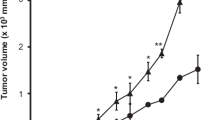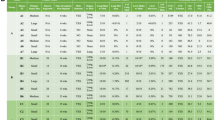Abstract
Lymph node metastasis are the first prognostic factor in breast cancer diagnosis and an early event in metastatic spread. To assess the role of anti-apoptotic proteins in lymph node metastatic progression of human breast cancer cells we analyzed the metastatic activity of MDA-MB-435 cells transfected with the Bcl-xL gene, after orthotopic inoculation in Nude Balb/c and in SCID mice. The luciferase gene was introduced by permanent transfection in the 435/Bcl-xL and 435/Neo cells and used as a tumor marker to measure the number of tumor cells lodged in lymph nodes. We found that 435/Bcl-xL tumor cells had enhanced organ-specific metastatic activity, preferentially lodging in peripheral lymph nodes, where at 45 days post-implantation we found 7 × 106± 6× 106 435/Bcl-xL.luc and 2 ±1.1 435/Neo.luc luciferase tagged tumor cell equivalents (TCEs). Metastases were abrogated in mice in which orthotopic tumors were induced with 435/Bcl-xL-antisense cells. Additionally, in vitro experiments show that in 435 cells Bcl-xL-antisense can override the emergence of resistance to apoptosis induced by TNF-α and TGF-β in cells overexpressing Bcl-xL, increasing also adhesion to extracellular matrix proteins. These results point to the relevance of Bcl-xL overexpression inducing lymph node metastasis of breast cancer cells, and to the value of this gene as a target for therapy in order to prevent metastasis.
Similar content being viewed by others
References
Rusciano D, Burger MM: Why do cancer cells metastasize into a particular organs?. BioEssays 14: 185–194, 1992
Luzzi KJ, MacDonald IC, Schmidt EE et al.: Multistep nature of metastatic inefficiency. Dormancy of solitary cells after successful extravasation and limited survival of early micrometastases. Am J Pathol 153: 865–873, 1998
Rudin CM, Thompson CB: Apoptosis and disease: regulation and clinical relevance of programmed cell death. Ann Rev Med 48: 267–281, 1997
Glinsky GV, Glinsky VV: Apoptosis and metastasis: a superior resistance of metastatic cancer cells to programmed cell death. Cancer Lett 101: 43–51, 1996
Nikiforov MA, Kwek SSS, Mehta R et al.: Suppression of apoptosis by Bcl-2 does not prevent p53-mediated control of experimental metastasis and anchorage dependence. Oncogene 15: 3007–3012, 1997
Cherbonnel-Lasserre C, Gauny S, Kronenberg A: Suppression of apoptosis by Bcl-2 or Bcl-xL promotes susceptibility to mutagenesis. Oncogene 13: 1489–1497, 1996
Hockenbery DM: Bcl-2 in cancer, development and apoptosis. J Cell Sci 18: 51–55, 1994
Nass SJ, Dickson RB: Defining a role for c-Myc in breast tumorigenesis. Breast Cancer Res Treat 44: 1–22, 1997
Del Bufalo D, Biroccio A, Leonetti C, Zupi G: Bcl-2 overexpression enhances the metastatic potential of a human breast cancer line. FASEB J 11: 947–953, 1997
Fernandez Y, España L, Mañas S et al.: Bcl-xL promotes metastasis of breast cancer cells by induction of cytokines resistance. Cell Death Differ 7: 350–359, 2000
Olopade OI, Adeyanju MO, Safa AR et al. Overexpression of BCL-x protein in primary breast cancer is associated with high tumor grade and nodal metastases. Cancer J Sci Am 3: 230–237, 1997
Sierra A, Castellsague X, Coll T et al.: Expression of death-related genes and their relationship to loss of apoptosis in T1 ductal breast carcinomas. Int J Cancer: 79: 103–110, 1998
Rochaix P, Krajewski S, Reed JC et al.: In vivo patterns of Bcl-2 family protein expression in breast carcinomas in relation to apoptosis. J Pathol 187: 410–415, 1999
Vakkala M, Lahteenmaki K, Raunio H et al.: Apoptosis during breast carcinoma progression. Clin Cancer Res 5: 319–324, 1999
Rubio N, Espana L, Fernandez Y et al.: Metastatic behavior of human breast carcinomas overexpressing the Bcl-xL gene: a role in dormancy and organospeci city. Lab Invest 81: 725–734, 2001
Ladeda V, Adam AP, Puricelli L et al.: Apoptotic cell death in mammary adenocarcinoma cells is prevented by soluble factors present in the target organ of metastasis. Breast Cancer Res Treat 69: 39–51, 2001
Boudreau N, Sympson CJ, Werb Z et al.: Suppression of ICE and apoptosis in mammary epithelial cells by extra-cellular matrix. Science 67: 891–893, 1995
Rodeck U, Jost M, DuHadaway J et al.: Regulation of Bcl-xL expression in human keratinocytes by cell-substratum adhesion and the epidermal growth factor receptor. Proc Natl Acad Sci USA 94: 5067–5072, 1997
Zhu Z, Sanchez-Sweatman O, Huang X et al.: Anoikis and metastatic potential of cloudman S91 melanoma cells. Cancer Res 61: 1707–1716, 2001
Tortora G, Caputo R, Damiano V et al.: Combined targeted inhibition of bcl-2, bcl-xL, epidermal growth factor receptor, and protein kinase A type I causes potent antitumor, apoptotic, and antiangiogenic activity. Clin Cancer Res 9: 866–871, 2003
Tanabe K, Kim R, Inoue H et al.: Antisense Bcl-2 and HER-2 oligonucleotide treatment of breast cancer cells enhances their sensitivity to anticancer drugs. Int J Oncol 22: 875–881, 2003
Mercatante D, Mohler J, Kole R: Cellular response to an antisense-mediated shift of Bcl-x pre-mRNA splicing and antineoplastic agents. J Biol Chem 277: 49374–49382, 2002
Olie RA, Hafner C, Kuttel R et al.: Bcl-2 and bcl-xL antisense oligonucleotides induce apoptosis in melanoma cells of different clinical stages. J Invest Dermatol 118: 505–512, 2002
Simoes-Wust AP, Olie RA, Gautschi O et al.: Bcl-xl antisense treatment induces apoptosis in breast carcinoma cells. Int J Cancer 87: 582–590, 2000
Vilenchik M, Raffo AJ, Benimetskaya L et al.: Antisense RNA down-regulation of bcl-xL expression in prostate cancer cells leads to diminished rates of cellular proliferation and resistance to cytotoxic chemotherapeutic agents. Cancer Res 62: 2175–2183, 2002
Goodison S, Kawai K, Hihara J et al.: Prolonged dormancy and site-speci c growth potential of cancer cells spontaneously disseminated from nonmetastatic breast tumors as revealed by labeling with green fluorescent protein. Clin Cancer Res 9: 3808–3814, 2003
Hart IR: Perspective: tumour spread–the problems of latency. J Pathol 187: 91–94, 1999
Karrison TG, Ferguson DJ, Meier P: Dormancy of mammary carcinoma after mastectomy. J Natl Cancer Inst 91: 80–85, 1999
Westermann J, Bode U: Distribution of activated T cells migrating through the body: a matter of life and death. Immunol Today 20: 502–506, 1999
Sierra A, Price JE, Garcia-Ramirez M et al.: Astrocyte-derived cytokines contribute to the metastatic brain specificity of breast cancer cells. Lab Invest 77: 357–368, 1997
Jaattela M, Benedict M, Tewari M et al.: Bcl-x and Bcl-2 inhibit TNF and Fas-induced apoptosis and activation of phospholipase A2 in breast carcinoma cells. Oncogene 10: 2297–2305, 1995
Liotta LA, Kohn EC: The microenvironment of the tumour-host interface. Nature 411: 375–379, 2001
Reiss M, Barcellos-Hoff MH: Transforming growth factor-B in breast cancer: a working hypothesis. Breast Cancer Res Treat 45: 81–95, 1997
Westendorf JJ, Ahmann GJ, Armitage RJ et al.: CD40 expression in malignant plasma cells. Role in stimulation of autocrine IL-6 secretion by a human myeloma cell line. J Immunol 152: 117–128, 1994
Oakley CS, Welsch MA, Zhai YF: Comparative abilities of athymic nude mice and severe combined immune deficient (SCID)mice to accept transplants of induced rat mammary carcinomas: enhanced transplantation efficiency of those rat mammary carcinomas that have elevated expression of neu oncogene. Int J Cancer 53: 1002–1007, 1993
Rosenberg SA: Progress in human tumour immunology and immunotherapy. Nature 411: 380–384, 2001
Smyth MJ, Trapani JA: Lymphocyte-mediated immuno-surveillance of epithelial cancers? Trends Immunol 22: 409–411, 2001
Wells A: Tumor invasion: role of growth factor-induced cell motility. Adv Cancer Res 78: 31–101, 2000
Author information
Authors and Affiliations
Rights and permissions
About this article
Cite this article
España, L., Fernández, Y., Rubio, N. et al. Overexpression of Bcl-xL in Human Breast Cancer Cells Enhances Organ-Selective Lymph Node Metastasis. Breast Cancer Res Treat 87, 33–44 (2004). https://doi.org/10.1023/B:BREA.0000041579.51902.89
Issue Date:
DOI: https://doi.org/10.1023/B:BREA.0000041579.51902.89




